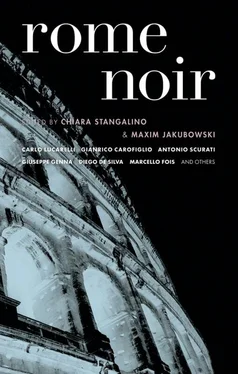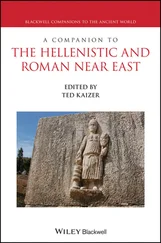Джанрико Карофильо - Rome Noir
Здесь есть возможность читать онлайн «Джанрико Карофильо - Rome Noir» весь текст электронной книги совершенно бесплатно (целиком полную версию без сокращений). В некоторых случаях можно слушать аудио, скачать через торрент в формате fb2 и присутствует краткое содержание. Город: New York, Год выпуска: 2009, ISBN: 2009, Издательство: Akashic Books, Жанр: Детектив, на английском языке. Описание произведения, (предисловие) а так же отзывы посетителей доступны на портале библиотеки ЛибКат.
- Название:Rome Noir
- Автор:
- Издательство:Akashic Books
- Жанр:
- Год:2009
- Город:New York
- ISBN:978-1-933354-64-4
- Рейтинг книги:3 / 5. Голосов: 1
-
Избранное:Добавить в избранное
- Отзывы:
-
Ваша оценка:
- 60
- 1
- 2
- 3
- 4
- 5
Rome Noir: краткое содержание, описание и аннотация
Предлагаем к чтению аннотацию, описание, краткое содержание или предисловие (зависит от того, что написал сам автор книги «Rome Noir»). Если вы не нашли необходимую информацию о книге — напишите в комментариях, мы постараемся отыскать её.
Rome Noir — читать онлайн бесплатно полную книгу (весь текст) целиком
Ниже представлен текст книги, разбитый по страницам. Система сохранения места последней прочитанной страницы, позволяет с удобством читать онлайн бесплатно книгу «Rome Noir», без необходимости каждый раз заново искать на чём Вы остановились. Поставьте закладку, и сможете в любой момент перейти на страницу, на которой закончили чтение.
Интервал:
Закладка:
— Take this exit, go on, I tell him, indicating the gypsy camp, I’ll shoot you there.
He obeys, with a kind of resignation to the awful day he’s having.
I tell him to drive to a particularly squalid area with some really ugly trailers.
— Get out, go ahead.
He complies. He is still crying, though less than before.
From their ratholes on wheels, a couple of gypsies are watching us like hyenas hoping for prey.
I get out too. I make him walk two or three yards from the car, then I tell him to turn around. Though it is a rotten thing to do, I let a few seconds go by.
I take his place behind the wheel. I close the car door.
The sound makes him turn around.
— Hey, Marcè, I say loudly, do you have your wallet?
He pats his back pockets.
— Y-yeah, he answers automatically.
— Did you hear that? I shout in the direction of the gypsies, who have just stepped out of their shitty vans. — He has his wallet on him, this guy!
Marcello looks at me in shock. He probably hasn’t understood a damn thing, demented as he is from everything that’s happening to him.
I start the car.
I pass alongside him.
He looks at me, incapable of any reaction.
— And now they’re your problem, I say, tossing my head back toward the gypsies who are beginning to approach.
Then I drive off.
In the rearview mirror, I see the hyenas starting to circle.
The two have already become four.
Roman Holidays
by Enrico Franceschini
Translated by Ann Goldstein
Villa Borghese
Settled at a table in a café, I check my watch: It’s still early for our appointment, but I’m already anticipating her arrival. I like to stretch out the tension, up until the moment I see her, suddenly, in the crowd, head high, with that unmistakable gait, which distinguishes her, and, I would say, elevates her above all others. Today, however, I know in advance how I’m going to spend the time that separates me from the first glance, the first furtive kiss, the first thrilling moment of the day we’ll spend together. I’ve brought a notebook with me, here to the café, a small book with a black binding, held shut by an elastic band: a handsome object with uncut pages, whose first lines I am filling with an old pen. Now I’ve taken a break, ordered a beer, lit a cigarette. What could be better, on a warm spring afternoon, than to sit in a café in the heart of Rome, have a sip of cold beer, take a drag on a cigarette, and prepare to write about the woman you love, knowing that in a couple of hours you’ll see her?
My name is Jack Galiardo, I’m fifty years old, I’m an American citizen of Italian ancestry: My grandparents emigrated to New York in the early part of the twentieth century — they came from the countryside right around here. I’m a lawyer, a criminal defense lawyer, and I have a professional bias toward writing: When I accept a new case, after studying the details I need to slowly construct the line of reasoning that I’ll use to defend my client, and the only way to do so effectively is to take notes, otherwise I can’t think. Cogito, ergo sum . Paraphrasing Descartes, I could say: I write, therefore I think. It’s valid here, too, at the café table, although the case I have to think about now is my own.
Two years ago, I was sitting on a plane next to a woman, an Italian. I was going to Rome to meet a witness who might be useful in a trial. She was returning to Italy from a short working trip to the United States. The flights from America to Europe generally arrive at dawn, so the majority of the passengers try to sleep; but that night the two of us weren’t tired and we got to know each other. I had recently begun to study Italian, drawn by a sudden curiosity about the land of my forebears, which had never much interested me as a boy; so the conversation unfolded mainly in her language. After a couple of drinks and the initial chitchat, I revealed something about myself: that I had been married and divorced twice, had two children already in college, two houses, one in New York and one in Florida, two cars. “Two of everything,” she commented, laughing. Then she told me that she was a journalist, that she was married, and that her husband was also a lawyer, in Rome; unlike me, he was not a criminal lawyer but, rather, worked in commercial law. They had three children, two boys and a girl, the last still small. Giulia — that was the name of my traveling companion — must have been forty, but she looked at least ten years younger. I soon discovered that she loved to talk: She did almost all the talking, jumping from one subject to another, telling endless anecdotes, little stories, situations — quite entertaining, I think. I can’t be sure, because after a while I had trouble following her, given my limited knowledge of Italian. But the sound of what she said, the tone of her voice, the rippling laughs with which she punctuated her speech fascinated me. I would have liked her never to stop.
The truth is that she could also have stayed silent: The effect on me would probably have been the same. I was in love with Giulia from the moment I saw her. I’ve never believed in the classic thunderbolt. I’ve had a certain number of women, some of whom — including the two I married — I liked a lot at first, but I’ve never really lost my head. I suppose that as a boy I must have had, like everyone else, a crush on the cutest girl in the class, but as soon as I reached the age of discretion I left romanticism behind; love songs, for one thing, have always seemed to me banal, foolish, excessive. I found all those sighs, that agitation, vaguely comical; they seemed a pose, an attitude, rather than expressions of true feeling. With Giulia, however, it was like plunging into a state of adolescent regression. To please her, win her, possess her suddenly became my only purpose in life. Every other concern or consideration disappeared. I had to make an effort, that night on the plane, not to make myself look ridiculous by kneeling at her feet and declaring my love, then and there, in front of stewardesses and passengers.
When we landed, I asked for her phone number, and proposed that we see each other the next time I came to Rome. My stay this time would actually be very short: I had to leave within twenty-four hours so that I wouldn’t miss a court hearing in New York. “I’d love to,” she said simply. And we parted.
Phrases that are repeated an infinite number of times, in an infinity of casual encounters, in the course of a life. We might never have seen each other again. But I couldn’t stop thinking about Giulia, and after just a few days I called her from New York. “Ciao, it’s Jack Galiardo... I’d like to see you again,” I recall myself saying, emotionally. I got immediately to the point: “I could come to Rome next week, if you have time.”
She had a moment of hesitation. “You’d come to Rome just for me?” she asked.
“Yes.”
She paused again, then said, “All right.”
Our first meeting was at Villa Borghese. Sitting on a bench, I made the declaration of love I would have liked to make on the plane. In a mixture of English and Italian, I described my image of her: alone, in a state of crisis with her husband, desperate for affection, for a man who desired her as no woman had ever been desired. And that man was me. Slightly put off, she said that I had misunderstood: She had agreed to see me, but that didn’t mean that her marriage was in trouble. I apologized. I added, however, that this suited me as well. That is, I was still happy to be there, on that bench, near her, even if she wasn’t having trouble with her husband and I was, at most, just slightly likable. It wasn’t a strategy to induce her to yield. I really felt that way: I felt that my love was so great that it was enough, at least at the beginning, for both of us. We got up from the bench and walked in silence for a little while, barely brushing against one another. In the square overlooking Piazza del Popolo she let me kiss her. We had lunch on the terrace of the Hassler. We continued to kiss, and then to touch, on the sofa of a deserted drawing room in the hotel, after lunch. We took a room there at the Hassler, although I was staying in another hotel. We made love until late afternoon. Then we descended to Piazza di Spagna, where she hastily said goodbye and got in a taxi. Walking as if in a trance, intoxicated with happiness, not knowing where I was or where I was going, I got a message on my cell phone: I already miss you. At that moment I knew: I had been knocked down. And I’ve never gotten up.
Читать дальшеИнтервал:
Закладка:
Похожие книги на «Rome Noir»
Представляем Вашему вниманию похожие книги на «Rome Noir» списком для выбора. Мы отобрали схожую по названию и смыслу литературу в надежде предоставить читателям больше вариантов отыскать новые, интересные, ещё непрочитанные произведения.
Обсуждение, отзывы о книге «Rome Noir» и просто собственные мнения читателей. Оставьте ваши комментарии, напишите, что Вы думаете о произведении, его смысле или главных героях. Укажите что конкретно понравилось, а что нет, и почему Вы так считаете.












